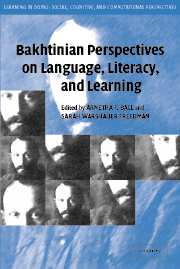Book contents
- Frontmatter
- Contents
- List of Contributors
- Acknowledgments
- PART I IDEOLOGIES IN DIALOGUE: THEORETICAL CONSIDERATIONS
- PART II VOICED, DOUBLE VOICED, AND MULTIVOICED DISCOURSES IN OUR SCHOOLS
- 5 Performance as the Foundation for a Secondary School Literacy Program: A Bakhtinian Perspective
- 6 Double Voiced Discourse: African American Vernacular English as Resource in Cultural Modeling Classrooms
- 7 Narratives of Rethinking: The Inner Dialogue of Classroom Discourse and Student Writing
- 8 Ever Newer Ways to Mean: Authoring Pedagogical Change in Secondary Subject-Area Classrooms
- Voices in Dialogue – Multivoiced Discourses in Ideological Becoming
- PART III HETEROGLOSSIA IN A CHANGING WORLD
- PART IV A CLOSING THOUGHT ON BAKHTINIAN PERSPECTIVES
- Author Index
- Subject Index
- Titles in the series
- References
7 - Narratives of Rethinking: The Inner Dialogue of Classroom Discourse and Student Writing
Published online by Cambridge University Press: 24 May 2010
- Frontmatter
- Contents
- List of Contributors
- Acknowledgments
- PART I IDEOLOGIES IN DIALOGUE: THEORETICAL CONSIDERATIONS
- PART II VOICED, DOUBLE VOICED, AND MULTIVOICED DISCOURSES IN OUR SCHOOLS
- 5 Performance as the Foundation for a Secondary School Literacy Program: A Bakhtinian Perspective
- 6 Double Voiced Discourse: African American Vernacular English as Resource in Cultural Modeling Classrooms
- 7 Narratives of Rethinking: The Inner Dialogue of Classroom Discourse and Student Writing
- 8 Ever Newer Ways to Mean: Authoring Pedagogical Change in Secondary Subject-Area Classrooms
- Voices in Dialogue – Multivoiced Discourses in Ideological Becoming
- PART III HETEROGLOSSIA IN A CHANGING WORLD
- PART IV A CLOSING THOUGHT ON BAKHTINIAN PERSPECTIVES
- Author Index
- Subject Index
- Titles in the series
- References
Summary
These students are changing their minds right and left. I remember, years later, precisely when and where this thought first occurred to me: sitting outside a sidewalk café on the outskirts of Berkeley, sorting through a stack of compositions from twelfth graders, their papers brightly colored by coding highlighters. I still remember the heat of the sun that morning in early summer. The class had written three times about a book they themselves had decided to read together: The Autobiography of Malcolm X. As I reread what each student had written before and after discussing it in class, it dawned on me. Discussing this controversial work together had led many students in the class to reconsider their assumptions. Some also began to reconsider their previous views about whether such books – and issues – belong in public high school English classes in the first place. Most remarkable of all, several virtually reversed their initial positions, in part to acknowledge the views of their classmates – above all, those who held opposing opinions about the work.
Perhaps all this will come as little surprise to teachers and English educators in the era of reader response theory. It has become almost a truism that the reading experience is a highly individual one. Whether we speak in terms of transactions, interactions, or connections, each student reader forges his or her own relationship with a work. And multiple perspectives are a given when interpreting any text in the classroom.
Information
- Type
- Chapter
- Information
- Bakhtinian Perspectives on Language, Literacy, and Learning , pp. 148 - 171Publisher: Cambridge University PressPrint publication year: 2004
References
Accessibility standard: Unknown
Why this information is here
This section outlines the accessibility features of this content - including support for screen readers, full keyboard navigation and high-contrast display options. This may not be relevant for you.Accessibility Information
- 7
- Cited by
